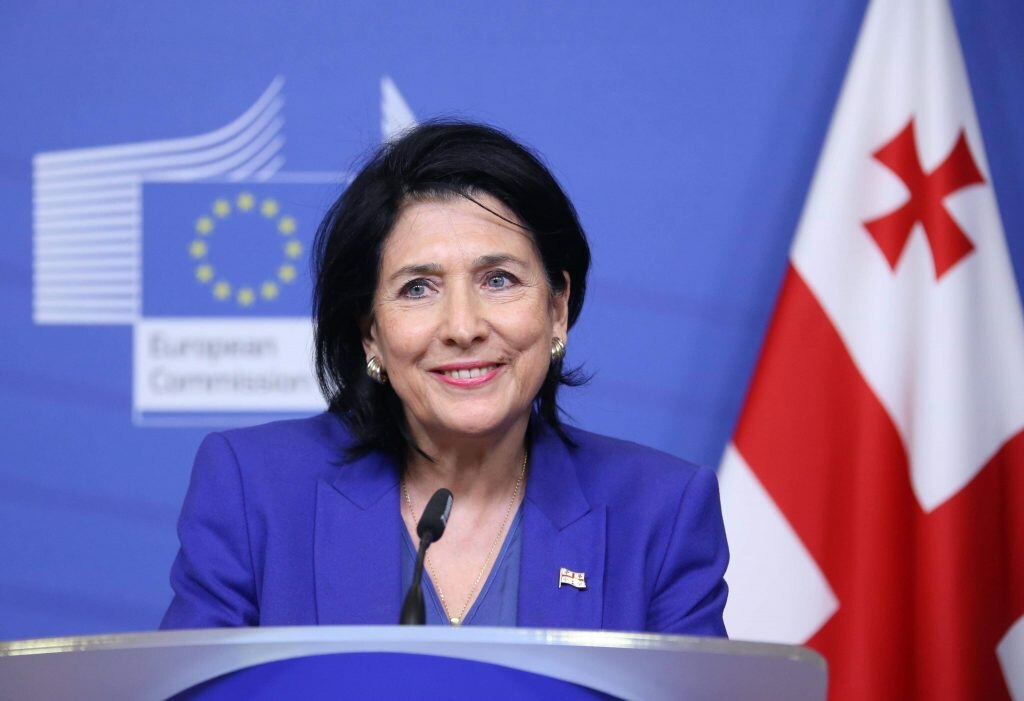Georgia's President and Government opposition
As Tbilisi prepares to vote in the parliamentary elections on 26 October, President Salome Zurabišvili is more and more openly presenting herself as the antagonist to the Georgian Dream, the pro-Russian force that has led the country for 12 years. He has demanded from his European partners the immediate resumption of EU integration talks in the event of an opposition victory. While Prime Minister Iraklij Kobakhidze is calling for his resignation in the event of his party's victory.
Tbilisi (AsiaNews) - In the run-up to Georgia's parliamentary elections, set for October 26, the pro-EU opposition to the openly pro-Russian Georgian Dream government is still searching for a leader capable of unifying them in a political struggle in which they appear confused, and unable to oppose a regime that has been in power for 12 years, and which relies on the strength of the Putin oligarch Bidzina Ivanišvili, founder of the ruling party.
The only figure who seems capable of representing democratic and Westernist demands is the President of the Republic Salome Zurabišvili, who has lately been increasingly taking sides against the government's policies.
The 72-year-old president (and head of the armed forces) is not only of pro-European tendencies; she is also authentically European, having French nationality, having been born in Paris to a family of Georgian refugees and having made a career in French diplomacy until becoming head of France's General Secretariat of Defence for International Affairs and Strategies between 2001 and 2003.
In 2004, she assumed Georgian nationality, by an agreement between the presidents of Paris and Tbilisi, becoming Foreign Minister of Georgia, also founding a party ‘The Way of Georgia’, before becoming the country's first female president in 2018, a term that expires next year.
Despite the opposition of the government and parliament, Zurabišvili continues her tour of EU countries, with visits in recent days to Warsaw and Brussels, to conduct negotiations on integration should the opposition forces win, in which case they would gladly see her as the new premier. Representatives of the Georgian Dream regard these visits as ‘unconstitutional forms of electoral campaigning’.
Indeed, the president explains in her meetings that ‘the upcoming parliamentary elections are very important, as they will decide the future of Georgia in its relations with Europe, they are in fact a referendum on the return to the past, or the opening to a new European future’, as she said in an interview with Euronews.
In the negotiations, the president's request to the European partners concerns the immediate resumption in the event of an opposition victory of the EU integration procedures, which are currently frozen after the approval of laws that are inadmissible in the West, such as the one on ‘foreign influences’ or the ban on ‘LGBT propaganda’.
In his opinion, ‘the coalitions confronting each other in Georgia have completely opposite visions, and the new government will find it difficult to move in one direction or the other anyway’. Zurabišvili's proposal is to form a ‘technical government’ after the elections, which would start the whole process from scratch.
According to polls cited by the president, 60 per cent of Georgian citizens are in favour of pro-European prospects, and 40 per cent support the current regime, despite ‘all the fraud organised by those who work in state offices, and who have an interest in defending their jobs’.
Prime Minister Iraklij Kobakhidze, on the other hand, trusts in a clear victory of the Georgian Dream, and then ‘Salome Zurabišvili will have to give up her prerogatives and resign from the presidency’. The ruling majority trusts in the end of the conflict in Ukraine ‘by the middle of next year’, says the premier, and then ‘we can finally proceed with a recapitulation of relations with all our partners’.
The vice-president of the majority parliamentary group, Iraklij Kirtskhalja, expressed himself in even less diplomatic terms, accusing the president of ‘working for the interests of the oppositions, and of imposing herself as the leader of the National Movement’, the liberal party founded by the former president now in prison, Mikhail Saakashvili.
Opposition representatives, on the other hand, are very satisfied with the president's European trips (she also went to Paris, where she met President Emmanuel Macron) and statements, as the leader of the ‘Coalition for Change’, Zurab Džaparidze, says that ‘Salome Zurabišvili is fully performing her functions as the flagship of European integration’.







.png)










